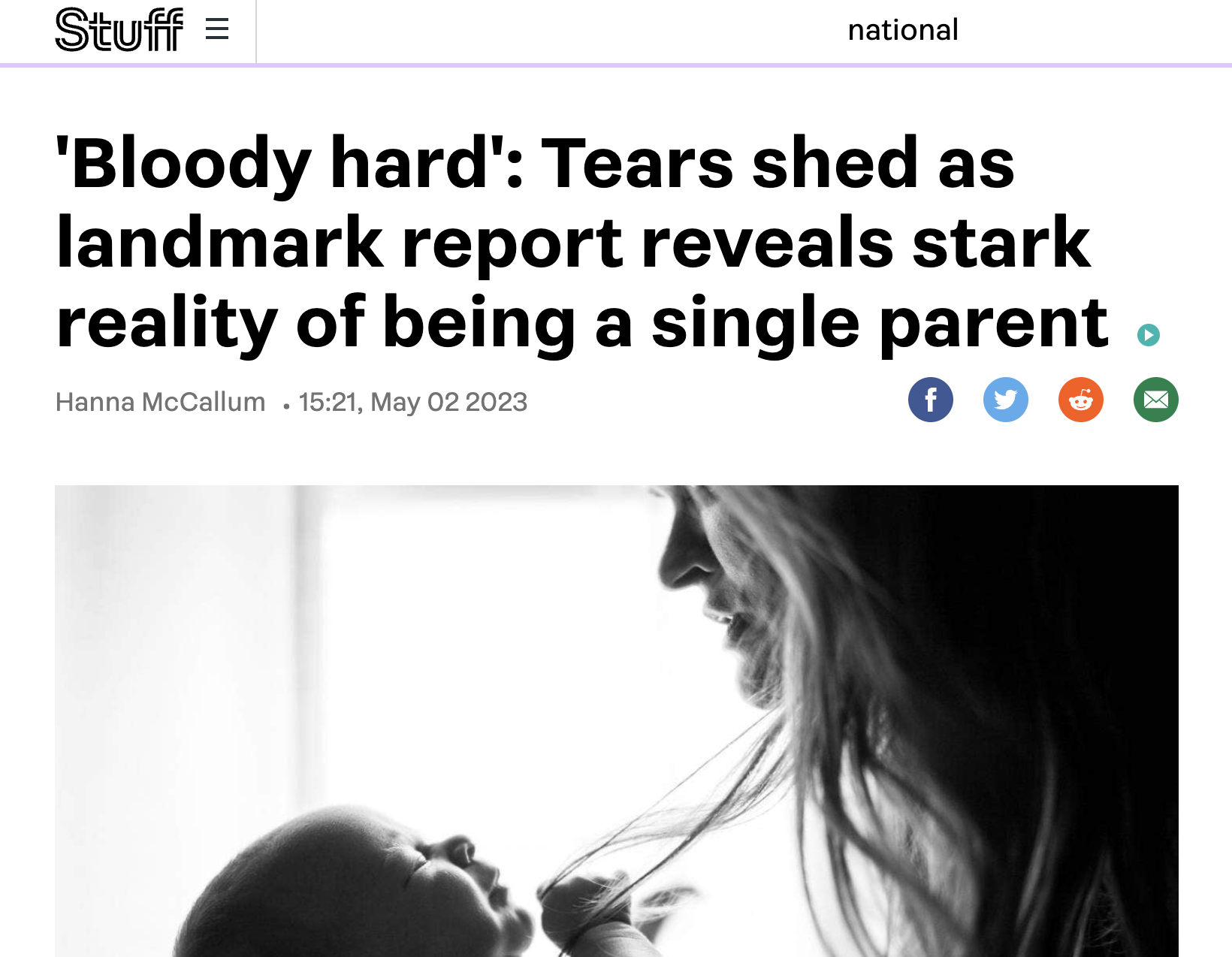
On behalf of Project Gender and Ngāti Kahungunu, we are thrilled to present the final report for Mako Mama - Mangopare, the Single Parents Project. This work has been commissioned and funded by the Peter McKenzie Project: we tautoko their dedication and determination to achieve meaningful systemic change and we thank them for their faith in our mahi. Your support has enabled us to amplify the voices of single parents across Aotearoa and we thank you for this.
Mā whero, mā pango ka oti ai te mahi.
(With red and black the work will be complete).
Nau mai, Haere mai - welcome.
Mako Mama - Mangopare in the media: 2nd May 2023


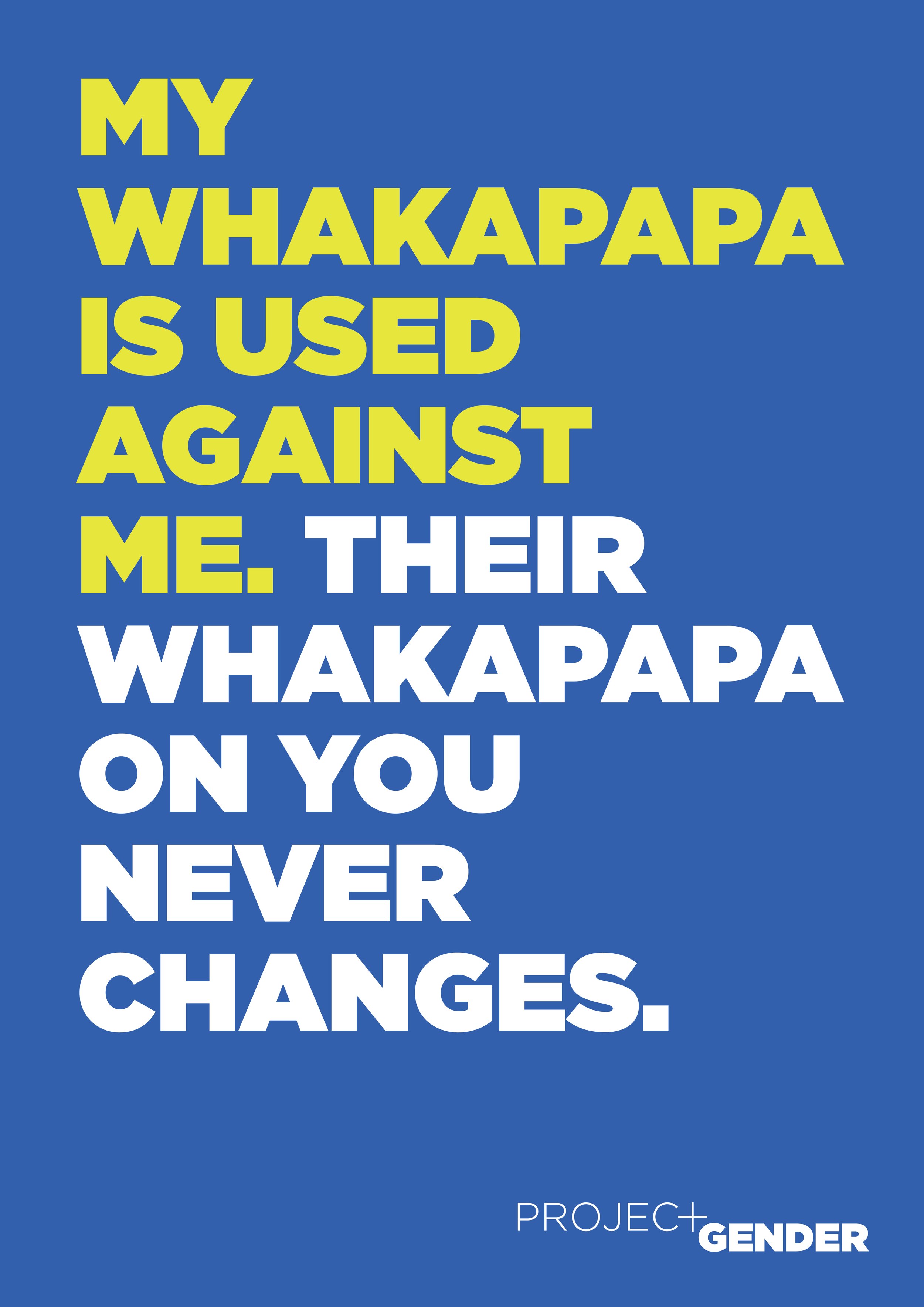





Single parent whānau have told us what they need.
Stakeholders, the sector, government and others agree.
We have identified opportunities to collaborate for change.
1. Promoting positive narratives of single parent families within the media and community.
Why: A primary prevention and social change approach is needed to address high rates of stigmatisation of single parents in New Zealand and create safer and more inclusive communities and families.
What: A nationwide media, marketing and communications campaign. The campaign would aim to change behaviours; mobilise communities; and address social attitudes that stigmatise single parents.
2. Creation of a ‘Navigators’ portal
Why: An online portal is needed to enable Single Parents to access all of the support available to them, provide interagency coordination, collaboration and communication; and establish and/or promote protocols, guidelines and systems between relevant agencies and service providers nationally, regionally and locally for information sharing and coordination of services.
The Kaupapa of the project to develop a ‘Navigators ‘portal is anchored in the knowledge that single parents are the experts of their own lives with a framework for single parents to create solutions for single parent families.
3. Protection, not investigation
Why: The single most impactful action to achieve this is to reframe our state responsibility for single parents towards protection and away from investigation.
What: Reframing state responsibilities for single parents towards protection not investigation and ensuring an intersectional lens is applied across all agencies.
How: The recommendations outlined in Mako Mama - Mangopare all support the shift towards integrating this approach within government, business and communities. We have divided them into three categories; systemic, policy and areas for immediate action.
Throughout the Mako Mama - Mangopare report we highlight the ways in which single parenthood is often stigmatised. In order for the 64,000+ Single Parent whānau in Aotearoa to thrive, a fundament shift is required in how government, businesses, and society think about, and engage with, single parents.
The single most impactful action to achieve this is to reframe our state responsibility for single parents towards protection and away from investigation.
We have identifed three top priority change areas:
Celebrate Us
Support Us
Respect Our Mana
Project Gender and Ngāti Kahungunu have worked in partnership on this project.
Our objectives were to ensure the experiences and voices of Maori whānau were iwi-led and followed the principles of Te Tiriti o Waitangi.
“The journey we have been on with Mako Mama - Mangopare has centred our whānau voice in a way that is empowering and strengths based. We have connected with different rōpū and heard from them what they need to thrive.”
Chrissie Hape, CE of Ngāti Kahungunu, speaking at the Mako Mama - Mangopare Stakeholder Hui in September 2022.
Key Themes that emerged from Ngāti Kahungunu:
Māmā under 20 - We don’t have a voice we feel discriminated against because we are young we are Maori we are single mothers.
Māmā over 20 - We don’t just want to job, we want a career and opportunities to study/work that fit our lives as sole carers for our tamariki
Whero whānau māmā – Resoundingly want Protection not Investigation.
Tāne Māori - Knowledge is power – give us the whole picture not just pieces of the puzzle
Mana wāhine - Decolonisation not colonisation.

Photos of Waimārama Beach taken during one of Project Gender's visits to the Hawkes Bay, whilst working with Ngāti Kahungunu
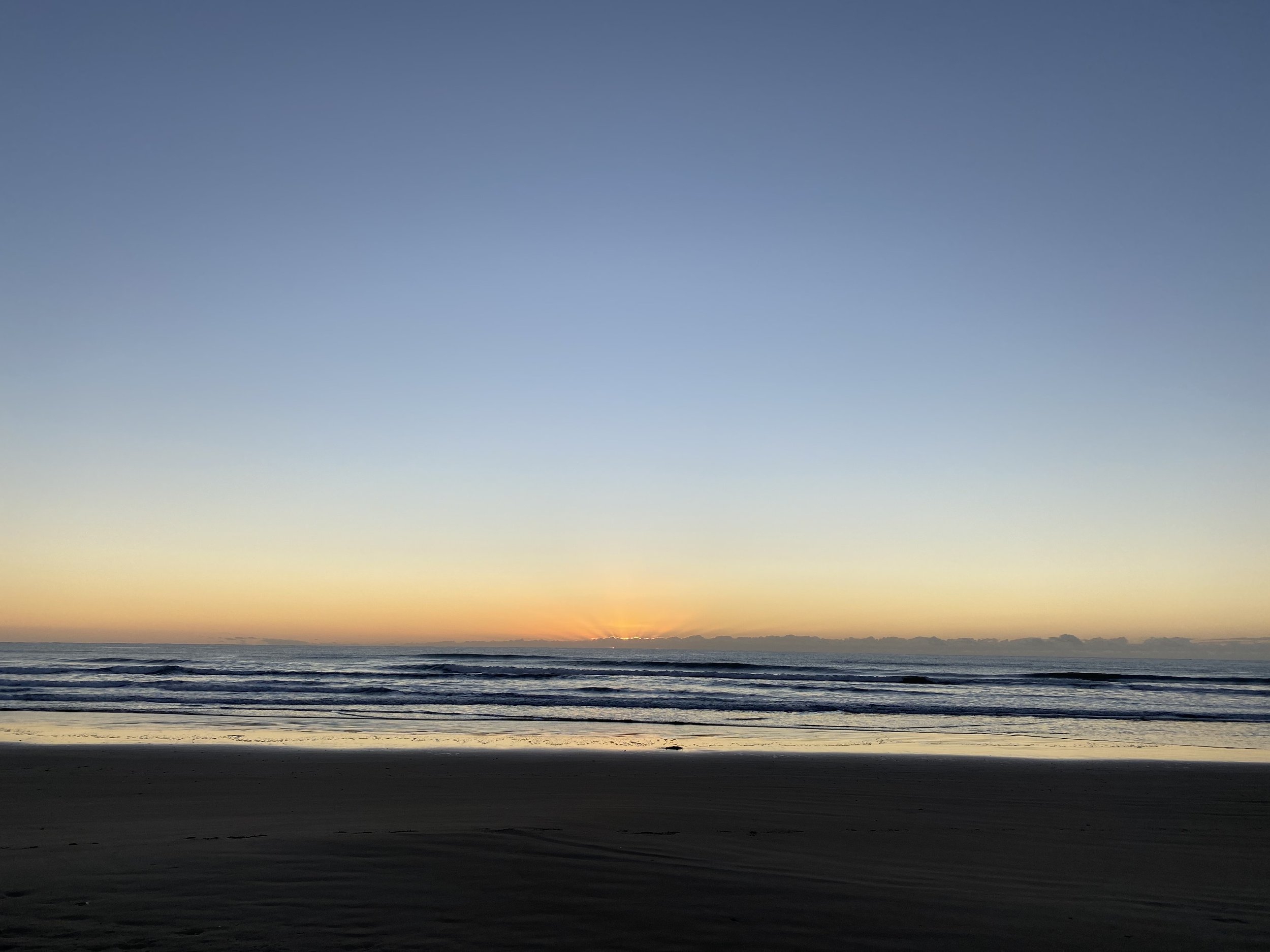
Photos taken in Waimārama, Hawkes Bay: Ngāti Kahungunu land


Engaging across Aotearoa
Mako Mama - Mangopare has been informed by:
3,545 survey respondents
Over 50+ stakeholders engaged in hui, including Members of Parliament, policy-makers, advisors, those from the private sector, community advocates and more. Many also have lived experience of single parenting.
7 focus groups conducted by Project Gender, with 43 participants
5 focus groups conducted by Ngāti Kahungunu
6 Project Advisory Group Members
The Environmental Scan conducted as the first stage of this mahi
A text received from a single parent when we appeared on Breakfast TV
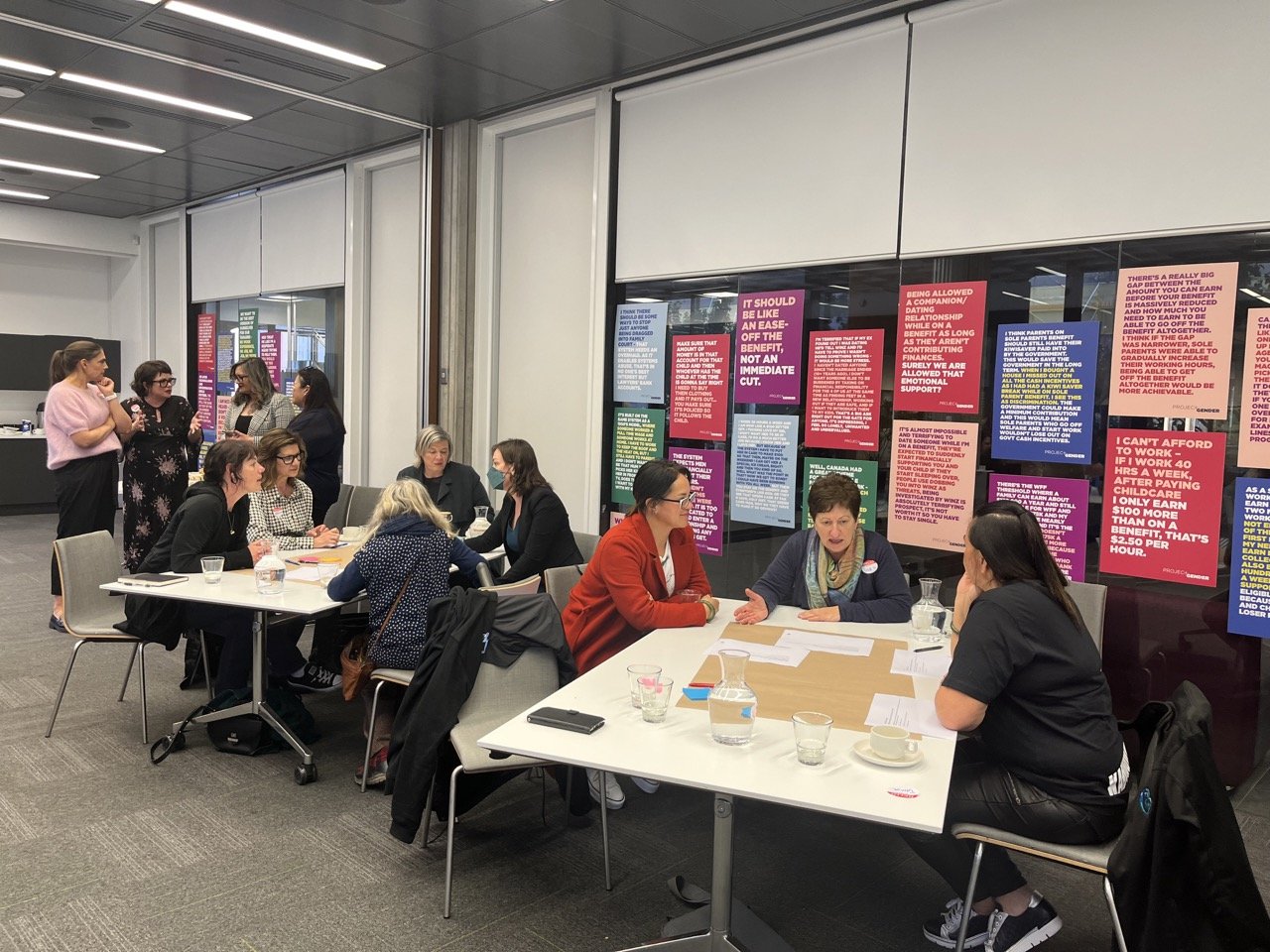
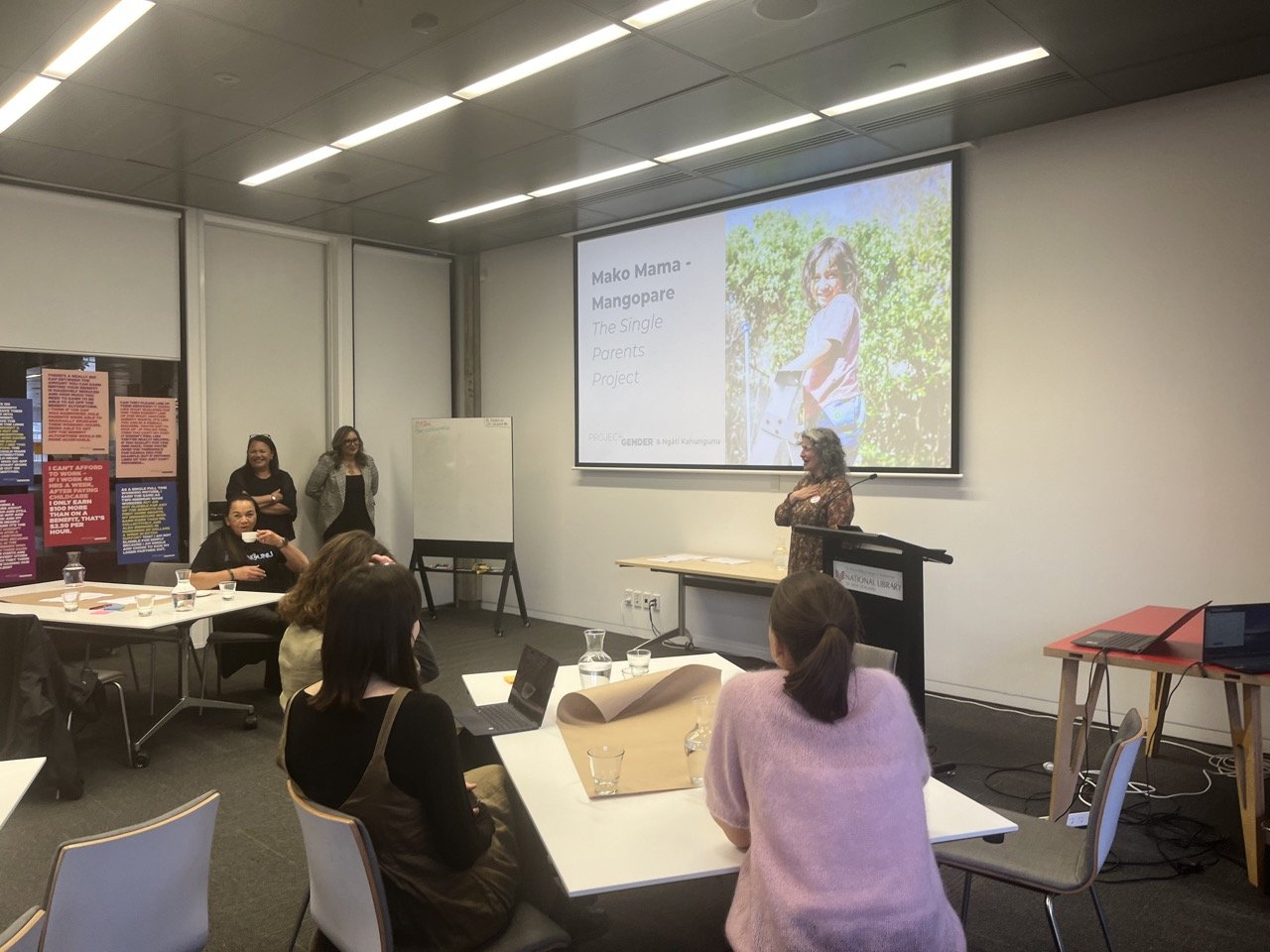
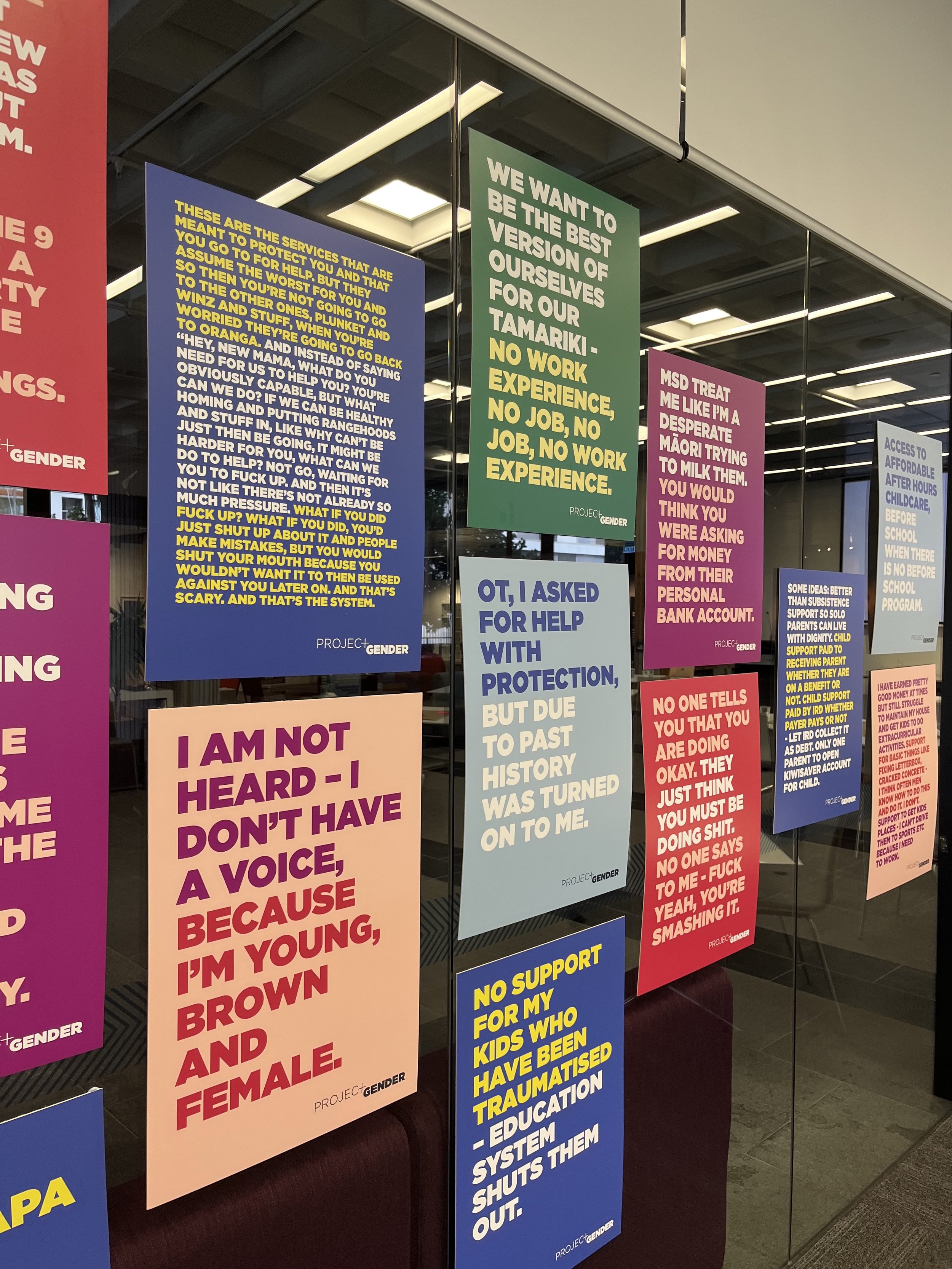
Our Set of Recommendations
-
Ensure the government systems supports single parent families, specifically by:
Reframing state responsibilities for single parents towards protection not investigation and ensuring an intersectional lens is applied across all agencies.
Reframing childcare from being a private profit-making venture to a public good.
Improving interagency coordination, collaboration and communication by identifying barriers to interagency coordination, collaboration and communication at all levels; and continuing to establish and/or promote protocols, guidelines and systems between relevant agencies and service providers nationally, regionally and locally for information sharing and coordination of services.
Redefining Sole Parent Support from a weekly payment that helps single parents find part-time work or get ready for future work to a weekly payment that supports Single Parents to parent their children.
Recognising that children are now a more ‘precious commodity’ i.e., we have lower rates of childbirth and ensuring policies are reflective of valuing children.
Acknowledging that gender-based violence and harassment disproportionately affects women and girls, and recognise that an inclusive, integrated and gender-responsive approach, which tackles underlying causes and risk factors, including gender stereotypes, multiple and intersecting forms of discrimination, and unequal gender-based power relations, is essential to ending violence and harassment in our society and enabling single parent whanau to thrive.
Ministry of Justice
Creating a more whanau centred family court approach as outlined in recommendation by The Child Poverty Action Group. (CPAG).
Treasury
Applying an intersectional gender lens across all government budgets — this needs to be actioned as a matter of urgency.
Commerce Commission
Encouraging the Commerce Commission to investigate single parent discrimination in renting.
-
IRD changes - to support single parents by:
Removing secondary tax on the Single Parent benefit
Updating the KiwiSaver criteria to remove the need for both parents/caregivers to sign children up for KiwiSaver.
Updating tax policies to ensure childcare can be claimed as expenses for tax purposes (this will benefit all parents).
Scoping the inclusion of a KiwiSaver contribution as part of the Single Parent benefit.
Ministry of Social Development
Apply benefit changes to support single parents by:
Implementing all recommendations to Working for Families as outlined by The Child Poverty Action Group (CPAG)
Changing relationship status policy on Single Parent benefit eligibility to be less restrictive, punitive and patriarchal.
Changing abatements by allowing a longer period of time before removing entitlements to benefits and related subsides. This will enable Single Parents to build up capital and support.
Adding child care subsidies to Single Parent benefits.
Ensuring policies prioritise the ability for parents to actively parent their children.
WINZ to scope funding single parent insurance -and /or providing interest free payment options
Scoping the opportunity for WINZ to include funding for home and contents insurance as outlined in this report from CPAG.
Ministry of Justice
Ensuring that single parents have easy access to legal aid and information, and are provided child care if they need to appear in court.
-
What is an action that can be taken immediately to support single parents?
Ministry of Social Development (MSD) and Ministry of Business, Innovation and Employment (MBIE)
MBIE to ratify the IPO convention clause 190 Violence and Work which outlines recognising the right of everyone to a world of work free from violence and harassment, including gender-based violence and harassment.
Ensuring the training of public servants (WINZ) towards protecting not investigating single parents and following the Domestic violence training as outlined in https://tepunaaonui.govt.nz/national-strategy/shift-3/
Introducing KPIs for frontline workers based on whether Single parent clients are receiving all the relevant information they are entitled to in an easy- to -understand manner.
Enabling Single Parents to attend WINZ interviews with their children.
Creation of a ‘Navigators Portal’ an integrated portal for Single Parents to engage with all government agencies similar to the functionality exhibited in Smart Start.
Creating Single Parent’s networks that operate similar to LGBTQI+ networks, within government agencies.
Changing the Green eftpos card provided by WINZ to be less stigmatising.
Promoting the MSD financial mentoring system to Single Parents.
Training and ongoing support for policy makers, frontline staff, government officials and communities towards ensure Single Parent whanau are protected and have equal opportunities to thrive and the development of a nationwide single parent network.
Ministries for Women, MBIE, and Education.
Aligning policy and action plans with the goals of the Women Employment Action Plan to include Single Parents.
Ensuring enrolment forms, and other resources, for schools include single parent whanau.
Ministry of Justice.
Family court to provide financial support acknowledging the psychological, technically time-consuming work, and childcare requirements for single parents' involvement in legal proceedings
Ministry of Commerce and Consumer Affairs.
Granting the Financial Markets Authority (FMA) statutory authority to monitor and address lenders’ financial inclusion policies and practices, including single parent borrowers.
-
Ensure businesses systems support single families, specifically by;
Integrating flexible working policies by default.
Ensuring a gender lens is applied to all workplace policies.
Encourage employers to enact single parent inclusive HR policies
Reporting and monitoring gender and ethnic pay gaps.
Subscribing to and implementing the PSA Gender Pay Principles.
-
Employers to support single parents by:
Creating flexible employment and providing or subsidising affordable childcare for single parents.
Developing employer benefit schemes that provide flexible, cost-effective childcare is available for single parent families.
Allowing employees to work during school hours and consider a ‘no meetings after 3pm rule’
Allowing single parents to use sick leave to care for their children.
Making it mandatory for employers to publish flexible working options for all roles.
Implementing the Fair Pay legislation recommendations.
Prioritise ‘Social” in Environmental, Social and Governance (ESG) reporting.
Financial institutions
Banks to consider child support payments as income when single parents apply for mortgage loans.
Investigating insurance options for Single Parents especially 3rd party, health and contents insurance.
Media
Promoting positive narratives of single parent families within the media and community.
Sharing stories of for single parents by broadening the definition of ‘family’ to reflect modern whānau and incorporate single parent families.
Sharing stories of the untapped potential of single parents- especially about underemployment and the untapped potential for businesses and government.
-
Employers
Registering their gender pay gap on Mind The Gap.
Registering their paid parental leave policies on The New Zealand Parental Leave Register.
Ensuring that the hourly part-time pay rate is the equivalent of full-time hourly pay rate.
Providing senior leadership roles on part-time/job-share basis.
Creating single parent’s networks that operate similar to LGBTQI+ networks, within businesses.
Providing financial wellness tools for single parents. Financial support should be less focused on budgeting – single parents know how to budget in many cases – financial support needs to be concentrated in other areas with a special focus on Māori. E.g. The Table
Ensuring products and promotional materials reflect single parent families.
Subscribing to and implementing the PSA Gender Pay Principles.
Housing
Encouraging rental agencies to eradicate single parent discrimination.
-
Ensure communities support single parents, specifically by;
Continuing to advocate for single parents' rights by addressing the prejudice and stigma towards single parent families by broadening the definition of ‘family’ to reflect modern whānau and incorporate single parent families.
-
Actively supporting and championing single parents.
Supporting a strengths-based campaign to celebrate the contribution of Single Parents to our society.
Holding fathers to account for childcare responsibilities – while recognising a small proportion of single parents are fathers who also require support.
Working with schools to improve after-school childcare schemes, and travel to and from school.
Offering single parent family tickets for products, services and fees e.g., public pools, campgrounds.
Ensuring products and promotional materials reflect single parent families.
Encouraging SportNZ to fund after school sports with a focus on ensuring they are affordable for single parents.
Partnering with intergenerational organisations to provide skills and knowledge trades, e.g. older people connect with single parents to provide home maintenance support.
Pulling together:
The insights from previous research and advocacy
What single parents told Project Gender and Ngāti Kahungunu they need to change in the system
What Project Gender learned from the stakeholder hui about the capacity and resources of system stakeholders for this mahi
… We make the following set of recommendations.
Here we have grouped our recommended solutions into three areas; systemic, policy and immediate actions. This list is intended to be an easy-to-use guide for government, businesses and community groups to identify and action the recommendations that pertain to them.
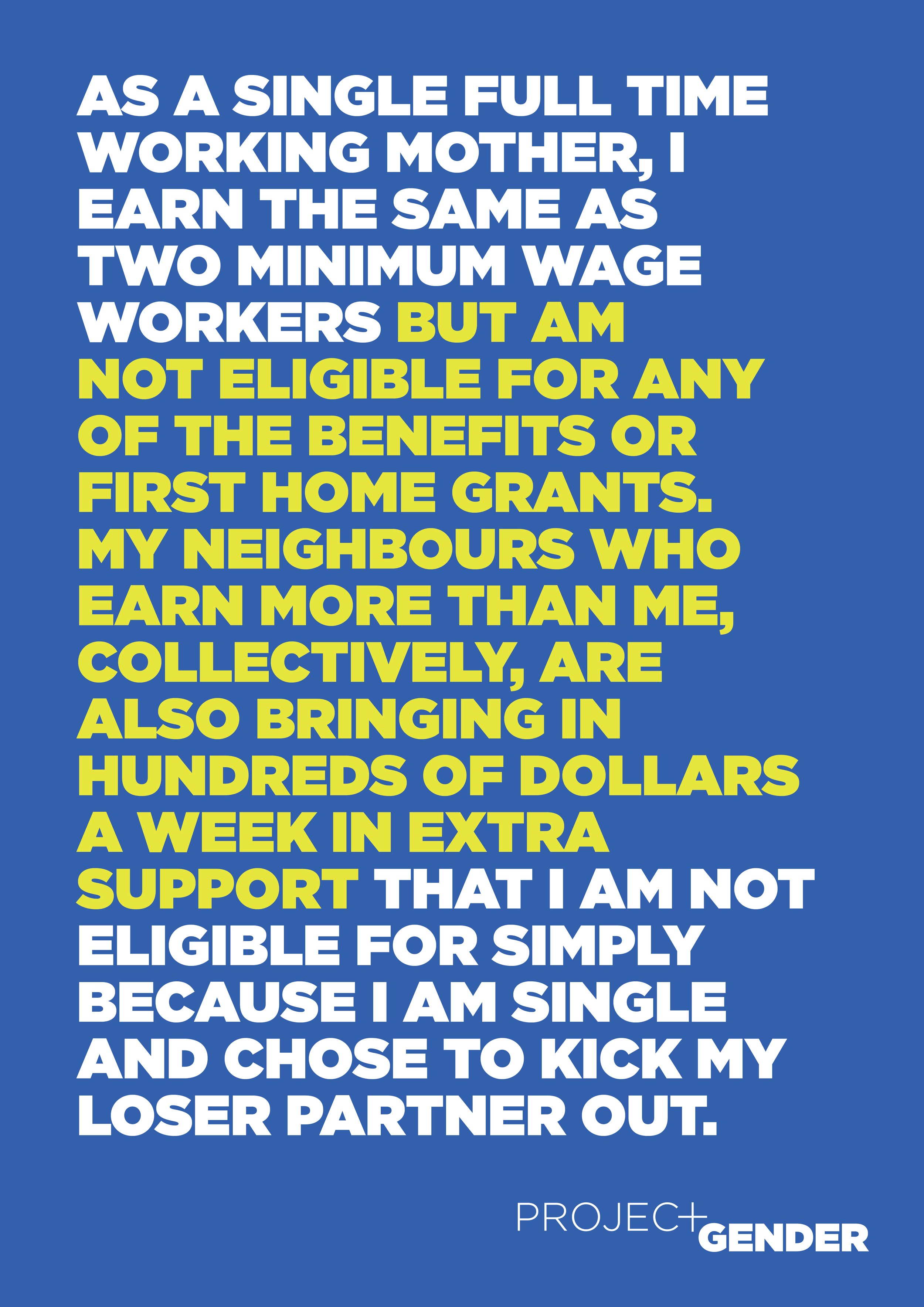




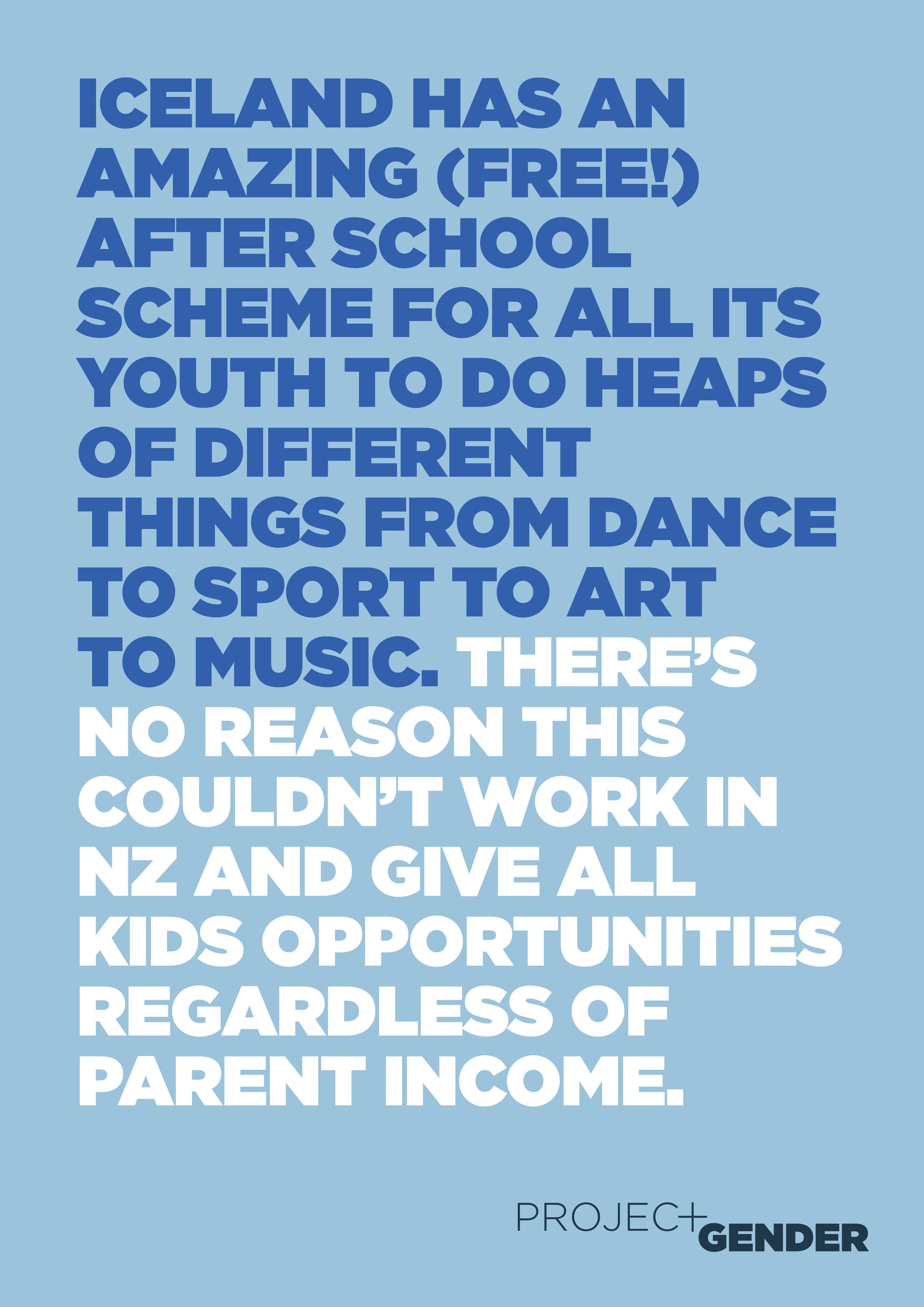


Who did we hear from in the Mako Mama - Mangopare Online Survey?
Mako Mama - Mangopare in the media
Tania appeared on Breakfast TV in August 2022, in order to promote the survey. This was a huge asset in promoting the mahi and encouraging single parents to complete the survey.
Many people have supported Mako Mama - Mangopare. As well as the generous support of Peter McKenzie Project, we would like to specifically acknowledge the following people and organisations who made this project possible:
The Project Advisory Group. Particularly as we framed up the engagement process and scope of this mahi, our Project Advisory Group were invaluable in testing, supporting and advising this work. Special thanks to Tui Te Hau, Deborah Mackenzie, Penny Henderson, Josie Glasson, Jean Hera and Leanne Inder for their time and energy.
Thank you to everyone who attended and participated in the Stakeholder Hui and the subsequent 1:1 hui: Members of Parliament, policy-makers, representatives from the private sector, community advocates and more. We have been honoured by the generosity of time and energy to look at how we can best create change.
From a Project Gender perspective, we would like to thank Ngāti Kahungunu for joining us in partnership. Your manaakitanga and genuine enthusiasm for Mako Mama - Mangopare has been an absolute gift to this mahi and we cannot wait to work with you on the next steps. Ngā mihi maioha.
Finally - to the more than 3,500 single parents who supported this project by sharing their insights, frustrations and suggestions for change. We hear you. We know that you know - more than anyone - what needs to change. We thank you for trusting us with your stories and we are committed to taking your voices forward. He aha te mea nui o te ao? He tangata he tangata he tangata! (What is the most important thing in the world? It is people, it is people, it is people!). Ngā mihi nui; kia ora rawa atu. We hope that we’ve done you proud.
This is the beginning for Mako Mama - Mangopare: we invite you to join us to create meaningful change for single parents, and their whānau, in Aotearoa.
Ngā mihi nui,
Project Gender & Ngāti Kahungunu
